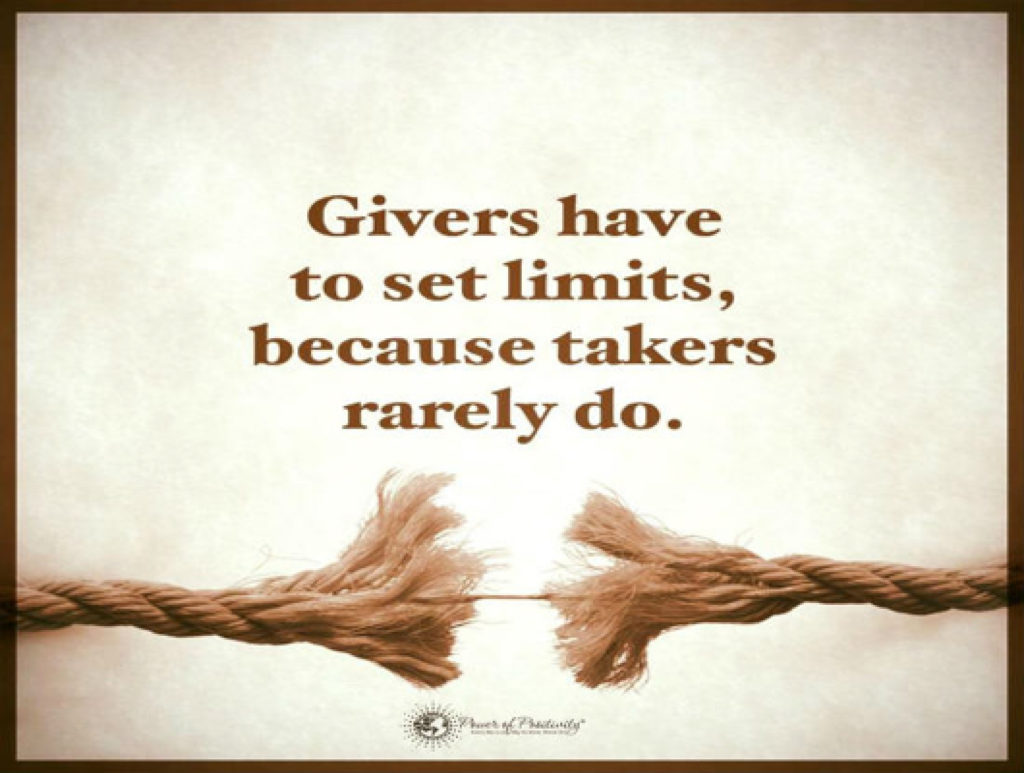“If you avoid conflict to keep the peace you start a war inside yourself.” –Cheryl Richardson
One of the most difficult yet important tasks of addiction family/friend recovery is understanding the importance of boundaries and letting go. Addiction recovery on either side – addict or not – is all about learning what are boundaries and how to set them. Learning about and maintaining boundaries in our life means honoring ourselves as an individual with desires, wants, and needs that are different from others. If we don’t have well-defined and healthy boundaries, we allow others to dictate and/or have control over our own feelings and desires.
We may not always get the response we want when we clearly define and set our limits to others, but it is still so important to be clear about our limits as spouses, children, parents, friends, human beings. The purpose of boundaries is separating what we want and need from others versus what they want and need from us. If we get the two confused then we end up becoming resentful, angry, vindictive, vengeful, ashamed, and/or riddled with self-doubt.

Setting our own limits versus Enabling
For example, if we tell our loved one – son, father, daughter, best friend, roommate, etc. – that we’ve “had it with their behavior” and “won’t let them live with me if they use or drink” and then don’t follow through on our word we have unhealthy boundaries. When we don’t maintain our boundaries, we set ourselves up for betrayal, abuse, manipulation, self-doubt, anger, resentment, and even self-blame. Without even realizing it, by not allowing our loved ones to face the consequences of their actions and addiction by either a) rescuing them from their choices (instantly bailing someone out of jail, calling into work for our loved one, etc.) or b) letting our loved ones walk all over us, we are stuck in the cycle of addiction with them.
The bottom line we need to remind ourselves throughout this process is asking ourselves:
“Am I truly willing to follow through with this?”
If the answer is no then it’s important to take a step back and deliberate with ourselves, write down, and/or talk to another about what are we actually willing to follow through with in this process. This is the concept known as “enabling” that is often tossed around in addiction treatment centers throughout the word. Enabling is the family’s attempt at trying to solve a problem, except that it takes out the teaching element of negative consequences. Family members may believe that by eliminating or reducing stress, they are eliminating a motive to use. Actually what we are doing is applying normal problem solving to abnormal/distorted thinking.
Some examples of common enabling behaviors would be calling for them when they are late from work, making excuses for them, waking them up in the morning, policing them, bailing them out of jail, not sticking to our guns on our rules, etc. Sometimes I get questions from my clients such as, “Well he didn’t pay the bills so I had to do that. She didn’t pick the kids up, what am I supposed to do? Isn’t that enabling?” The answer is maybe, but these are behaviors that also necessary for our own survival. It’s not in YOUR best interest to have the utilities shut off or the mortgage not paid.

Helping Versus Enabling
A very quick and easy way to help you to discern the difference between helping versus enabling is to ask yourself the following questions:
- What was my behavior?
- What were my thoughts and motivations at the time?
- What was I feeling at the time?
- Did I feel this behavior hurt me? Make my life unmanageable? Was I trying to manipulate my loved one’s behavior?
Finding Your Own Support
If, after answering each of these questions, you have determined you are doing something for someone else they could for themselves and/or these actions make your life more painful and unmanageable then it might be time to reassess. This is where therapeutic support from a mental health professional as well as support groups for teenaged children of addicts, partners of sex addicts, and loved ones/relatives of individuals struggling with alcoholism and/or addiction are essential. Often, I and many of my clients run into the issues of being judged for what we or are loved ones are going through, blame for where we went wrong, or advice without really listening; sometimes we just want to be heard and helped.
Coping with mental illness and addiction is often just as difficult for the family or friend as it is the patient. The most common question I get as a therapist is “What can I do to help?” and my most common answer is “Take care of yourself and get our own support.” Addiction and mental illness affect everyone regardless and our loved ones may never fully recovery. However, we still deserve to live a full life and to take care of ourselves through trying times.
Are you ready to be supported through this process? Please consider receiving the help you deserve by clicking here to connect with one of our therapists.
Lifeworks Recovery also helps provide support to loved ones of addicts/alcoholics through group therapy.
About the Author
Nick Overbeck is both a Licensed Professional Counselor and Licensed Chemical Dependency Counselor. Nick has nearly a decade of experience in mental health including college counseling, trauma informed treatment, career counseling, suicide prevention, crisis intervention, addiction treatment (drugs, alcohol, sex, porn, love, gambling, and video gaming), promoting mental/emotional wellness in working professionals, and working with loved ones of those affected by addiction and/or mental illness.
